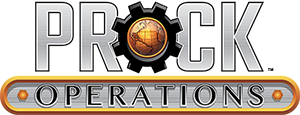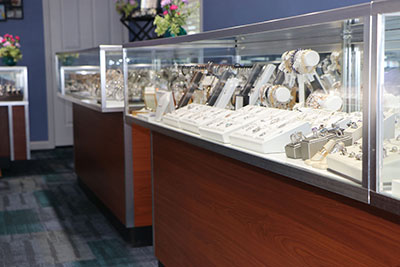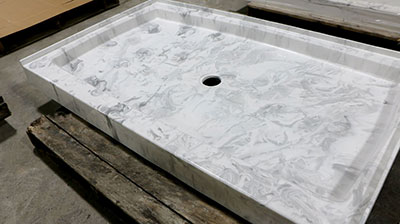
"It absolutely has helped keep us going as a business."
That's what Carla Lee, Prock Operations corporate counsel, said about the Missouri Small Business Development Center (SBDC) support and the coronavirus relief the company received through the U.S. Small Business Administration (SBA) earlier this year.
Prock Operations is a manufacturing company in St. James, Missouri. Their initial — and, for a long time, main — line of manufacturing was cabinetry and display cases and racks to outfit convenience stores.

"Prock was originally started because there was a problem with convenience stores being able to get all of those display products in the same place," Lee said. "So, it was started to fulfill that need back in the '80s."
Since then, Prock Operations has branched out into freezers and walk-in and reach-in coolers through its sister company Snowman Cooler, and flooring, surfacing and showcases through new internal divisions. They have also bought two small manufacturing companies — one in Lee's Summit, Missouri, and the other in Omaha, Nebraska — and a property in Cuba, Missouri, that they renovated and relocated some of their manufacturing into.
Even with all that growth, Prock Operations is still a small business. And when the spread of the new coronavirus became a pandemic early this year, they felt the squeeze.

Retail department stores, bakeries and restaurants are the bulk of Prock Operations' customer base. As soon as it was apparent that those businesses were struggling, "we knew we were going to be in trouble, too," Lee said. "We had hundreds of thousands of dollars of work sitting here ready to go, but suddenly, then, they couldn't pay or they weren't ready to ship or they weren't allowed to bring stuff in."
At many small businesses, employees fill multiple roles — as does Lee. One of her roles, aside from legal counsel, is to handle various government funding aspects of the business. Thus, she was the point person with the Missouri SBDC at Missouri University of Science and Technology in Rolla after COVID-19 started spreading throughout the U.S.
After initial exploration into the company's options in February, Lee reached out to the Missouri SBDC for guidance in early March. There she connected with business development specialist Travin Shelton.
"He was amazing," Lee said of Shelton.
Shortly before the Coronavirus Aid, Relief and Economic Security (CARES) Act was passed, Shelton "talked us through what some of the options would be" and how the Economic Injury Disaster Loan (EIDL) no longer applied only to physical injury, Lee said.
"I had an initial conversation with Carla and a few members of the leadership team," Shelton said. "They were asking some very specific questions … a lot of 'what if' questions."
Throughout the following weeks, "all these questions kept coming up," Lee said.
In the beginning and all the way through, they had questions pertaining to the loan programs: how to get them, how to best use them, and how to have them forgiven, Shelton said.
"For a while, right after we started applying for the Paycheck Protection Program [PPP], I think I had questions for [Shelton] four or five times a day," Lee said. "I would email him a list and he would always get back to us really quickly with really useful answers."
In addition to consulting with Shelton, "I was on four or five meetings a day with the small business Zoom meetings and the various town halls and various talks with representatives," Lee said.
"Sometimes it felt like [the relief programs] were changing every hour," Lee said. "So, having someone else who could kind of keep an eye on that, too, really helped me."
And when Prock Operations had questions that Shelton didn't know the answer to, he would find someone who did, Lee said.
With Shelton's guidance, Lee was able to navigate the applications
Prock Operations received a PPP loan. Their sister company, Snowman Cooler, received both a PPP and an EIDL loan.
The PPP "helped us keep the doors open and keep people employed," Lee said.
Even though the company was considered essential as part of the supply chain for construction, shortly before the CARES Act was passed, Prock Operations had to do "a round of furloughs," Lee said.
"When we got the PPP, we were able to bring everyone back even though we didn't necessarily have enough work to keep them all busy," Lee said. "And it allowed us to keep benefits going."
With the help of the PPP and EIDL loans it received, Snowman Cooler was also able to keep people on the payroll, plus it was able to cover some needed working capital.
Lee said the company was having trouble sourcing some of the materials needed for manufacturing because the material providers were in states that were shut down or where they weren't considered essential, or they were closed because their employees were contracting COVID-19.
Because of these issues, "the cost of materials had gone up, in some areas, quite a bit," Lee said.
The infusion of cash from the EIDL loan enabled Snowman Cooler to source the needed materials even at the inflated prices — and keep the manufacturing floor open.
Before the pandemic began, Prock Operations had begun shifting its business model in a couple of ways.

Instead of focusing exclusively on designing custom pieces for retail and convenience stores and the hospitality industry, they had expanded to also manufacturing surfaces that generally have a standard size, shape and design, such as the bathroom vanities you find in a home improvement store.
The drastic slowdown in business in the retail, convenience store and hospitality markets due to the pandemic caused them to refocus on the manufacture of the standard surfacing pieces.
Prock Operations was also in the process of starting a foam recycling program before the pandemic.
The walk-in coolers have a polystyrene foam insulation that is very hard to recycle. "It usually just ends up in the landfill," Lee said.
So, Prock Operations pursued and received some grant money to set up a recycling program to keep that from happening.
"A little delayed because of COVID," the machine arrived earlier this year, Lee said.
The machine densifies the foam, melts it down and repacks it into blocks of the type that are often used as packaging for electronics.
Although Prock Operations had intended to be accepting foam from other companies by this time, they are currently recycling only their own foam. The revised plan is to start accepting foam from other companies early next year, "depending on how the next few months go," Lee said.
Because of the support of the Missouri SBDC through the "chaotic, painful time" of 2020, Prock Operations can look forward to 2021 and the expansion of their recycling efforts.
"I cannot even put into words how wonderful that support has been," Lee said. "SBDC has been amazing and continues to be amazing. I cannot recommend it highly enough."
Facebook
Spartan Showcase
For Your Convenience
Prock Operations
Writer: Victoria Stokes